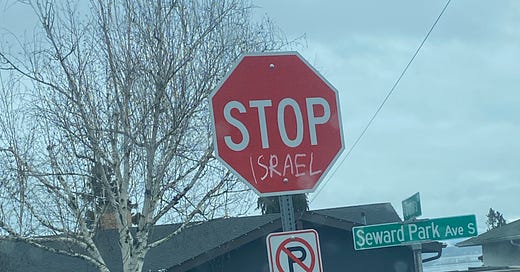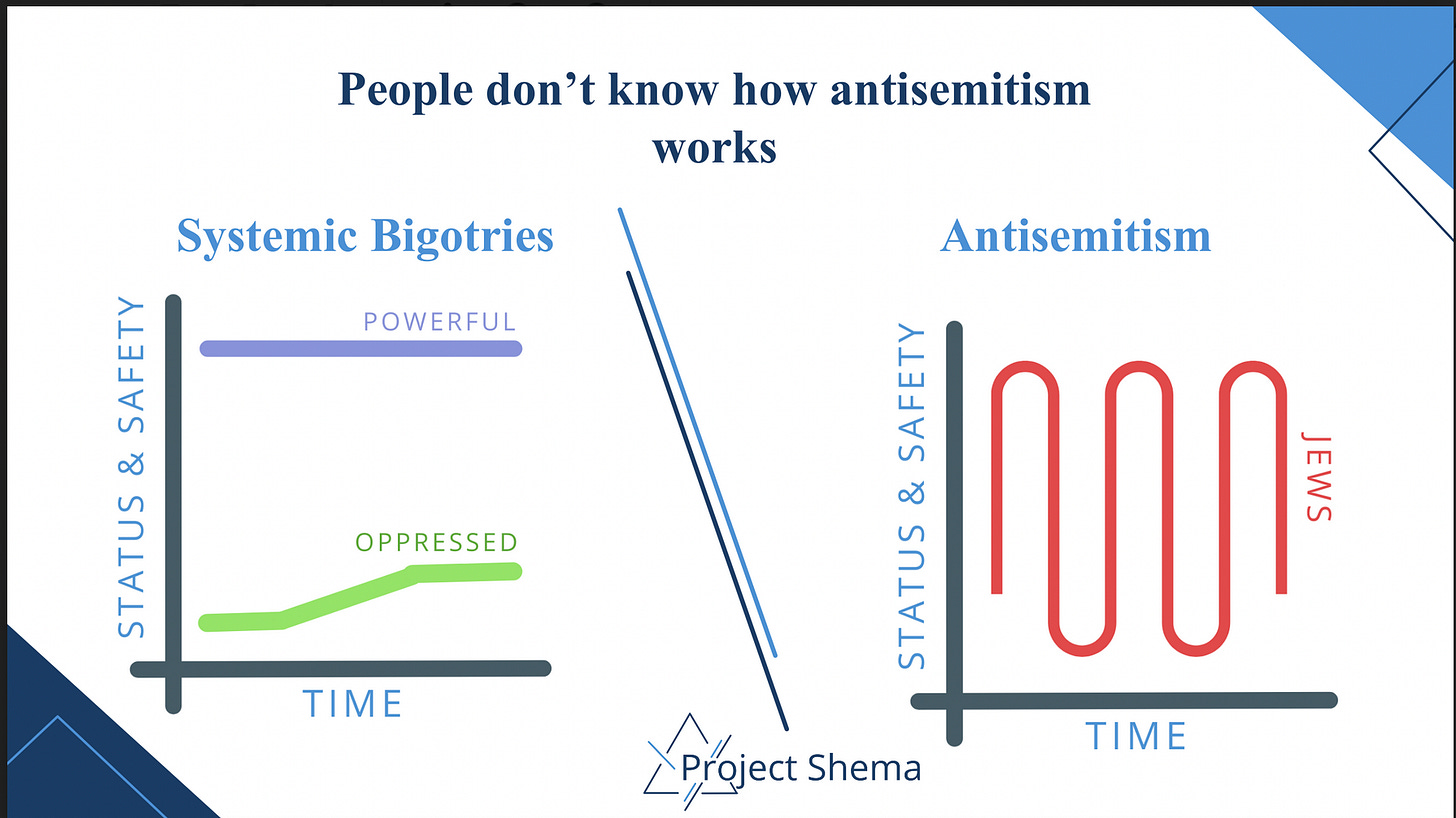After the attacks of October 7th, Ishai Shvartz’s 9-year-old child was confronted by a fellow student who said, “I’m a terrorist. I’m going to kill you.”
It wasn’t the first, or last, incident of Jewish and Israeli children at public and private schools in Greater Seattle experiencing hateful comments and even threats, in addition to anti-Israel posters, chants, and walkouts during the school day.
Shvartz noticed that the administration treated the incidents as “casual bullying.” He went to the school board and discovered a network of families. “I realized every child and parent has experienced the same things,” he says. “It’s not unique. It happens across the state.”
Shvartz also got involved with a new grassroots initiative in the Seattle area to combat anti-Semitism. The #CallOutHate and #CallItAntisemitism campaign, which launched on Monday with a press conference at the Holocaust Center for Humanity, strives to “elevate public awareness of and motivate community action to speak out against antisemitism,” according to a campaign one-pager.
After months of escalating incidents and the highest levels of anti-Semitic reports in America in decades — and for many, the sense that the organized Jewish world has no real action plan — the campaign mobilizes Western Washington community leaders to participate in a “never before attempted response to the escalating incidents of hate, intimidation, and harassment faced by the Jewish community in the Seattle area and beyond.” While it consists of myriad local organizations and individuals and has no formal leadership structure, the JCRC serves as the logistical home.
The strategy is informed by Project Shema, an organization that uses a relational approach to combating anti-Semitism, especially in progressive spaces.
Confronting Anti-Semitism in Progressive Spaces
“How do we talk about our story of self?” Kristin Winkel recalls a moment when she realized anti-Semitism had crept into a progressive space. When her daughters were teens at a Seattle-area private school, they watched a play at school about an ethical issue. But in an apparent theatrical oversight, the villain, a banker named Golden, was a clear Jewish …
“One of the things we’re focusing on is building awareness and educating,” says JCRC director Max Patashnik. “We ourselves have a lot of education and awareness building to do in our own community about the history of anti-Jewish harm and how it’s manifesting today.”
Patashnik steers away from the language of anti-Semitism, preferring “anti-Jewish harm.” Anti-Semitism, like Judaism, is hard to define, and Jews can get bogged down by terminology. This leads to an ineffective “whack-a-mole” approach to fighting hateful incidents.
The campaign instead looks at each incident of harm and works with relevant parties to understand it and prevent it. “We intentionally chose not to publicize any one definition of anti-Semitism,” Patashnik says. “What are the types of harm being perpetuated? You can hand someone a definition, but it takes awareness building to recognize anti-Jewish harm.”
“People can acknowledge that a swastika is anti-Semitism,” says Lisa Colton, a consultant with years of Jewish organizing experience who is working with the campaign. “But there is a lot of subtle stuff that happens that can be rationalized.”
That’s what Shvartz has found in the schools. “In middle school and high school, there are incidents with teachers using materials calling Israel a genocidal state,” he says. “You could say it’s criticism of Israel, but you are not creating a safe environment for Jewish and Israeli kids to learn. I don’t see the same level of ‘let’s teach you about Russia.’ It’s not even history yet. The facts are not even known. Why this conflict out of all the conflicts?”
“When you demonize someone, the ends justify the means,” Colton says. “Once you have that binary and you demonize that side, the people who think they are standing for goodness and justice start doing hateful things.”
This is what campaign organizers want to get in front of: working with leaders to disrupt what Patashnik calls the “permission structure” of anti-Semitism. “You’re not allowed to demonize Jews or dehumanize Jews or erase Jewish identity in service of political speech,” she says.
The challenge is that it’s hard to see, because systemic anti-Semitism looks different than systemic racism.
Jews don’t fall into parallel formation of oppressor-oppressed relationships, but rather weave through time and space on the cultural winds. This is why it’s hard for a school administrator to differentiate between “casual bullying” and a potential hate crime.
One of the key tools of the campaign is asking for specific and precise language. “When they use works like colonization, occupation, apartheid, genocide,” says Patashnik, “these words have different meanings.” She cites a study that found some 70 percent of Americans don’t know what Zionism means. Take the statement that Zionists are Nazis, she suggests. “If you have no idea of what Zionism is, it’s very hard to understand why that can be seen as impinging on the safety of Jews here,” she says.
The campaign launched a website, callitantisemitism.com, with basic information and a call to action to get involved. According to Patashnik, next steps include holding round tables and building cross-community relationships. She urges people to use their hashtags and to call out anti-Jewish harm publicly.
Patashnik admits that ushering community leaders from education to action could take a long time. But according to Colton, the collaboration across the community and the response from non-Jewish allies has already been positive.
“Lots of people recognize there’s a problem and they don’t know what to do about it. They’re wringing their hands and staying quiet,” she says. “Part of the goal of this campaign is to help people see how they can make a difference and give them a playbook for how to do that.”
Community Announcements
Check out the Seattle Jewish community calendar.
Check out ways to support Israel through UNX (UnXeptable) Seattle.
Celebrate the 70th Anniversary of Camp Solomon Schechter and the lifelong friendships formed at Camp! Join us for Schechter Spark 2024 IN-PERSON in Seattle, Portland or Vancouver BC on Sunday, May 5 at 4:00 p.m. To learn more, register, share memories and support Camp with a donation, visit https://www.campschechter.org/spark-24/
Candlelighting in Seattle is at 7:17 p.m. The parasha is Tzav.
Shoutouts
Please leave shoutouts in the comments this week!
Shoutout to everyone who has already RSVP’ed for Passover lunches at Hillel UW on Thursday, April 25 and Friday, April 26, and looking forward to seeing friends, family, students and neighbors at Hillel UW! www.hilleluw.org —Jonathan Greene





While I appreciate the need to address antisemitism in the Seattle area, the contortions that this initiative seems to take is head scratching. This issue is not as complicated as it is made out to be. To me we are discussing Jew-hatred which is not hard to define. No one seems to want to condemn this behavior except for Jews themselves, but not unless it includes all hatred of other groups. Why is it that Jew hatred cannot stand on its own as an evil. It’s because non Jews don’t see it as such and therefore won’t engage. This is a deeper problem
I don't think we can only rely on organizations to protect us. I experienced zero support after reporting antisemitic comments in a video played at a King County government commission meeting. We also need broad-based grassroots organization and efforts.